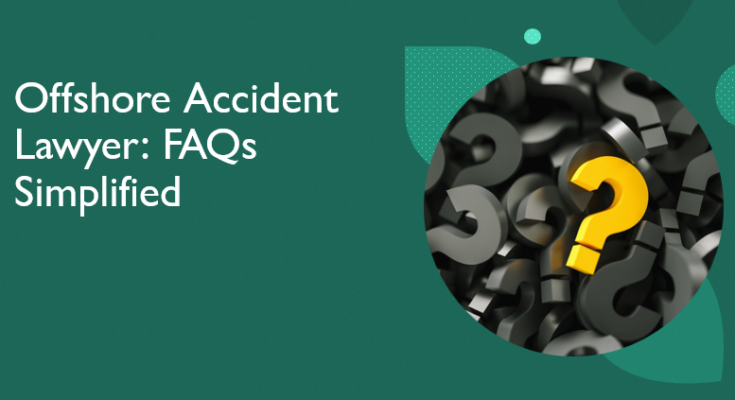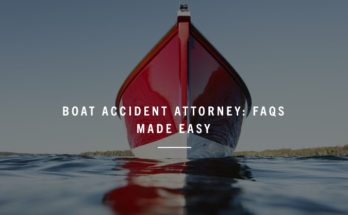Offshore accidents are serious incidents that occur in maritime environments and involve various types of injuries and fatalities. These accidents can arise from equipment failures, human error, hazardous weather conditions, lack of proper training, and other factors. This post takes a look at notable offshore accident compensations recovered by some law firms while answering some frequently asked questions on offshore accident lawyer.
What is Offshore Accident Law?
Offshore accident law encompasses the legal principles, regulations, and statutes that govern incidents and injuries occurring in maritime environments. These laws are designed to protect workers and passengers involved in offshore activities, such as those on oil rigs, ships, and other marine structures. Offshore accident law includes the following areas of law and statute:
Maritime Law (Admiralty Law): Maritime law regulates activities and injuries on navigable waters, including oceans, rivers, and lakes and addresses issues such as vessel collisions, maritime contracts, and injuries to seamen and passengers.
Jones Act: The Jones Act provides protections for seamen who are injured due to their employer’s negligence while working on a vessel and allows injured seamen to seek compensation for medical expenses, lost wages for period of inability to work, physical pain and emotional suffering, and other damages.
Longshore and Harbor Workers’ Compensation Act (LHWCA): This Act covers dockworkers, harbor workers, and other maritime employees not covered by the Jones Act. it also provides compensation for work-related injuries and occupational diseases, including medical expenses and rehabilitation costs.
Death on the High Seas Act (DOHSA): This Act provides compensation to the families of workers who die due to wrongful acts, negligence, or default occurring on the high seas (beyond three nautical miles from shore). It also allows for recovery of pecuniary losses, such as loss of financial support and funeral expenses.
Outer Continental Shelf Lands Act (OCSLA): The OCSLA Extends LHWCA benefits to workers on the outer continental shelf engaged in resource extraction activities, such as oil and gas drilling. It also covers injuries and deaths occurring on offshore platforms and related structures.
General Maritime Law: General Maritime Law encompasses various principles and doctrines, i.e. maintenance and cure, unseaworthiness, and limitation of liability. It also provides additional legal remedies and protections for maritime workers.
What is an Offshore Accident?
An offshore accident refers to an incident that occurs while working in an offshore environment, typically on oil rigs, drilling platforms, or ships at sea. These accidents can result in injuries, fatalities, and significant property damage.
What are The Types of Offshore Accidents?
The following are some types of Offshore Accidents:
- Oil Rig and Platform Accidents: Includes blowouts, equipment failures, explosions, and falls. Generally, these are Injuries resulting from hazardous working conditions and lack of safety protocols offshore.
- Ship and Vessel Accidents: Includes collisions, groundings, capsizing, and man overboard incidents.
- Diving Accidents: Includes decompression sickness, equipment malfunctions, and underwater hazards.
- Helicopter Transport Accidents: Includes crashes and hard landings during transportation to and from offshore sites.
- Dock and Pier Accidents: Includes slips, trips, and falls, as well as vehicle and machinery accidents.
Who Is an Offshore Accident Lawyer?
An offshore accident lawyer is a legal professional who specializes in representing individuals who have been injured or involved in accidents while working or traveling in maritime environments. These lawyers possess specialized knowledge of maritime law, including the various statutes, regulations, and legal principles that govern offshore activities. Their primary role is to advocate for the rights of injured workers and passengers, ensuring they receive fair compensation and legal protection.
Who do I talk to after an Offshore Accident?
Knowing who to talk to after an offshore accident is essential for protecting your health, legal rights, and overall well-being. Immediate medical attention, reporting the incident to your employer, gathering information from witnesses, consulting with an offshore accident attorney, and communicating with insurance companies and government agencies are critical steps.
1. On-Site Medical Personnel
Most offshore facilities have medical staff or first responders trained to handle emergencies. Seek immediate help from them to address any urgent injuries. On-site medical personnel, often referred to as offshore medics, are trained to provide immediate medical care.
They can assess the severity of injuries and administer first aid, which is vital in preventing further complications. If your injuries are severe, you may need to be transported to a hospital for more extensive treatment. Ensure you get a complete medical evaluation and follow all prescribed treatments.
Also, medical personnel will document your injuries and treatment, creating a medical record that can be essential for any future legal claims. This documentation serves as evidence of the injuries sustained and the treatment received, which is critical for establishing the extent of damages in a potential lawsuit.
However, it’s always best to be careful. The on-site medic works for your employer and may try to get statements from you that could undermine your injury claim later. Avoid discussing details of the accident or the extent of your injuries with them. Also, on-site medics are not neutral third parties. Their role is to provide immediate care, not to determine the full extent of your injuries or your long-term prognosis. For an objective medical assessment, you should see your own doctor. Saying the wrong thing to the on-site medic could potentially undermine your ability to recover full compensation for your injuries later.
While the on-site medic may seem helpful, they ultimately work for your employer. To protect your legal rights and ensure you receive proper medical care and compensation, it’s best to avoid discussing your accident or injuries with them and instead consult your own doctor and an offshore injury attorney.
2. Your Employer
After an offshore accident, it is very important to Inform your direct supervisor about the accident as soon as possible. Providing a detailed account of the incident is crucial for initiating an internal investigation and ensuring workplace safety. Specifically, ensure that you submit any necessary accident reports and documentation to the HR department. This step is essential for processing any workers’ compensation claims or other benefits.
Please take note that you must be very careful while speaking to your employer. Conversations with your employer can be misinterpreted or taken out of context. Statements made in a moment of stress or confusion may not accurately reflect the circumstances of the accident or your injuries, which could be used against you later when you file a lawsuit.
Also, your employer may prioritize their interests over yours, particularly regarding liability and financial implications. They might attempt to downplay the incident or pressure you to minimize your claims, which can jeopardize your rights to fair compensation.
Before discussing the accident with your employer, it is advisable to consult with an experienced maritime or personal injury lawyer. They can provide guidance on what to say, what to avoid, and how to protect your rights throughout the process.
3. Witnesses and Coworkers
It is important to speak to anyone who witnessed the accident. Get their contact information and ask them for statements detailing the accident as they witnessed it. Engaging with coworkers and witnesses after an offshore accident is vital for gathering evidence, supporting your claims, and ensuring that your rights are protected. Their testimonies can significantly impact the outcome of any legal or insurance proceedings, making it essential to document their accounts as soon as possible after the incident.
Having coworkers corroborate your version of events can strengthen your case. Their statements can serve as evidence in any legal proceedings or insurance claims, demonstrating that the accident was not solely your fault and that safety protocols may not have been followed.
Also, speaking with coworkers may reveal if similar accidents or near-misses have occurred in the past. This information can highlight systemic issues within the workplace that need to be addressed, potentially strengthening your claim against the employer for negligence.
4. Legal Professionals
Consult with a lawyer who specializes in offshore accidents and maritime law. They can guide you through the complexities of filing a claim and help you understand your legal rights and options. Many attorneys offer free initial consultations. Use this opportunity to discuss the details of your case, understand the potential for compensation, and decide whether to hire their services.
Consulting with an offshore accident lawyer after an incident is vital for protecting your rights and ensuring you receive the compensation you deserve. Their expertise in maritime law, combined with their ability to navigate the complexities of your case, can make a significant difference in the outcome of your claim. Offshore accidents are governed by complex maritime laws that differ significantly from standard workers’ compensation laws. An experienced attorney can help you understand your rights under these laws, including potential claims under the Jones Act or other maritime regulations.
Employers may retaliate against workers who file claims or report accidents. An attorney can help protect your rights and provide guidance on how to navigate any potential retaliation from your employer. Injuries from offshore accidents can lead to significant medical expenses, lost wages, and long-term impacts on your earning capacity. An attorney can help you calculate the full extent of your damages and pursue maximum compensation, including medical costs, pain and suffering, and future earnings.
5. Government Agencies
Speaking to the appropriate government agencies after an offshore accident is vital for ensuring legal compliance, facilitating investigations, and protecting your rights. It can also provide valuable documentation and resources that support your recovery and any potential legal claims. Engaging with these agencies helps promote accountability and safety within the offshore industry.
Government agencies typically conduct investigations into offshore accidents to determine the cause and assess compliance with safety regulations. By reporting the incident, you contribute to a formal investigation that can hold negligent parties accountable and promote safer working conditions in the future.
Reporting the accident can help protect your rights as an injured worker. It establishes a formal record that can be referenced later if there are disputes regarding the circumstances of the accident or your eligibility for compensation.
Can I Handle My Offshore Accident Case Myself?
Handling an offshore accident case involves navigating complex legal, medical, and procedural challenges. While it is technically possible to handle your case independently, it may be a very bad idea. Handling an offshore accident case yourself is extremely risky. The stakes are too high. Consulting with an experienced offshore accident lawyer is the best way to protect your rights and maximize your chances of recovering the full compensation you are entitled to under the law.
What Happens If I’m Fired For Suing My Employer In My Offshore Accident Case?
If you are fired for suing your employer in your offshore accident case, several important factors come into play regarding your rights and potential legal recourse. First off, firing an employee for filing a lawsuit related to a workplace injury can constitute illegal retaliation. Under laws like the Jones Act and other employment protections, employers are prohibited from punishing workers for exercising their rights to seek compensation for injuries sustained on the job. If you believe your termination was retaliatory, you may have grounds for a separate legal claim against your employer.
If you are terminated after filing a lawsuit, it is crucial to document everything related to your employment and the circumstances of your firing. Keep records of communications, performance reviews, and any statements made by your employer regarding your lawsuit. This documentation can be vital in proving that your termination was retaliatory. If you successfully prove that your firing was retaliatory, you may be entitled to compensation for lost wages, emotional distress, and other damages resulting from the wrongful termination.
Does Being Fired Affect My Offshore Accident Case Against My Employer?
While being fired can complicate your situation, it does not necessarily affect your original offshore accident case. You can continue to pursue your claim for compensation related to your injuries, even if you are no longer employed by the company.
Can I File My Offshore Accident Case After Some years?
Filing an offshore accident case after a significant amount of time has passed can be challenging due to the legal concept known as the “statute of limitations.” The statute of limitations sets a deadline for filing a lawsuit, and failing to file within this period can bar you from pursuing your claim.
Under the Jones Act, which covers seamen injured due to employer negligence, the statute of limitations is three years from the date of the accident or injury. However, in some cases, the time limit may begin from the date the injury was discovered, or reasonably should have been discovered, rather than the date of the accident.
For longshoremen and harbor workers, the LHWCA typically provides one year from the date of injury to file a compensation claim. If the injury is an occupational disease, the statute of limitations may be extended to two years from the date of awareness of the disease. The DOHSA, which provides for claims by families of seamen who died due to wrongful acts, neglect, or default on the high seas, has a three-year statute of limitations.
Thankfully, there are some exceptions to these rules. If the injured person is a minor or legally incapacitated, the statute of limitations may be tolled (paused) until the minor reaches the age of majority or the incapacitation is lifted. Also, if the employer or responsible party deliberately concealed the cause of injury or engaged in fraud, the statute of limitations may be tolled until the injury is discovered. In addition, in cases where the injury results from ongoing exposure or continuous harmful conditions, the statute of limitations may reset with each instance of exposure or harm.
What Do I Do When my Time for Filing the Suit Has Passed?
Meet with a good offshore accident lawyer as soon as you can. They can provide a thorough evaluation of your case, including the applicable statutes of limitations and any possible exceptions. An attorney can review your situation to determine if there are any grounds for tolling the statute of limitations or if any exceptions apply.
How Much Will it Cost to Get An Offshore Accident Lawyer?
In most cases absolutely nothing!! You don’t get to pay anything until your case is won. Most offshore accident lawyers work on a contingency fee basis, meaning you only pay legal fees if you win your case. Contingency fees usually range from 25% to 40% of the total recovery. The exact percentage can depend on the complexity of the case, the lawyer’s experience, and the stage at which the case is resolved. Some lawyers may be willing to negotiate the fee percentage, especially for higher-value cases or if the case is settled early without going to trial.
In addition to the contingency fee, there may be out-of-pocket expenses associated with handling your case. These can include court filing fees, costs for obtaining medical records, expert witness fees, and other litigation-related expenses. Some offshore accident attorneys cover these costs upfront and are reimbursed from the settlement or judgment amount. Make sure to discuss how these expenses will be handled before hiring your lawyer.
Recommendation
If you are looking for an offshore accident lawyer, I recommend the following law offices to you for the best outcome for your case:
Conclusion
By addressing common questions and concerns, this guide aims to simplify the intricacies of offshore accident cases. Whether you are dealing with immediate medical expenses, long-term rehabilitation costs, or the emotional toll of your injury, having a knowledgeable attorney by your side can make all the difference. If you or a loved one has been involved in an offshore accident, consulting with a specialized lawyer can provide the support and legal expertise needed to navigate this challenging time.
For more interesting articles about your favorite lawyers click here: ftyuh.com



